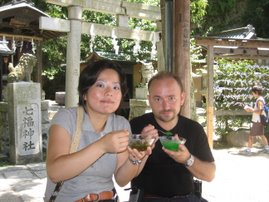My first trip to Japan began in the autumn, so some of my earliest memories are of frigid evenings and the foods that go with them. The Japanese tradition of nabe-ryori or "pot cooking" covers a wide variety of stock based soups and stews. The kitchen menu of most Japanese restaurants in the states will include staples like nabeyaki udon, a rich soup of vegetables and thick noodles. I've even seen some places that make shabu shabu, a soup cooked at the table in a large nabe pot and featuring raw ingredients (meat, veggies, tofu, etc.) that the diners place in boiling stock and cook to their own desired doneness. Less frequently seen on menus here is oden, a braised vegetable dish that is often served in sake bars and from streetside rolling carts on cold winter nights. For some reason I've had oden on my mind these last few days so I decided it would be a good way to inaugurate the season.

Oden can consist of many ingredients, but one thing that it must contain is daikon radish. In addition, for tonight's dinner I included shiitake mushrooms, potato, carrot, two types of fish cakes (kamaboko & chikuwa), konnyaku (yam cake), peeled hard boiled eggs and cubes of deep fried tofu.

The first step is to create the braising liquid. I have several clay nabe pots, but none are big enough for this dish. Instead I used a stainless steel Korean braising pot, into which I placed a square of konbu kelp and water. As the pot came to a boil, I added two teaspoons of instant dashi powder and seasoned to taste with the Japanese trinity (equal parts of soy sauce, sake, and mirin).

All of the ingredients were cut into bite sized pieces and added to the broth. The pot was returned to a boil, covered and the heat reduced to a simmer. I cooked the dish for about 90 minutes, until everything was very tender.

Spoon the ingredients into serving bowls, along with a little of the stock. Japanese like to add a little spicy Chinese-style mustard to each bite, and drink sake with their oden. Sounds like a great way to warm the body on a cold evening doesn't it?

